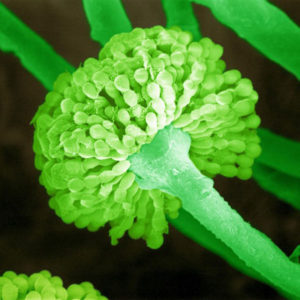Fungal Pathogen Genomics
9–13 May 2023
Wellcome Genome Campus, Hinxton, UK
Hands-on training in web-based data-mining resources for fungal genomes
Summary
The kingdom of Fungi includes a biologically diverse group of organisms adapted to different environmental niches, playing important roles in ecosystems, human/animal/plant health and global food security. Fusarium,Pyricularia, Ustilago, Puccinia, and Zymoseptoria species threaten agricultural ecosystems and food security worldwide, while Aspergillus, Candida, Mucor, Cryptococcus, Histoplasma, Coccidioides, Batrachochytrium and other fungal pathogens cause allergies, illnesses, and sometimes life-threatening infections that are of great concern for veterinary and medical professionals around the world. Furthermore, fungi are also important model systems for basic and applied research and workhorses in biotechnology, food, pharmaceutical, and biofuel industries.
Advancements in high throughput ‘omics’ data generation technologies enable researchers to carry out large-scale analyses of genomes, transcriptomes, proteomes, and metabolomes of numerous fungal organisms to address questions about pathogenicity, host-pathogen interactions, and identify new drug targets. To facilitate accessibility and analysis, several web-based bioinformatic resources have been developed.
This week-long course is a collaborative teaching effort between the following resources supporting fungal and oomycete species:
- FungiDB/VEuPathDB
- Ensembl Fungi
- SGD/CGD
- MycoCosm/JGI
The Fungal Pathogen Genomics course provides hands-on training on how to take advantage of unique tools offered by each database; develop testable hypotheses, and investigate genomics, transcriptomics, proteomics, and other types of data across multiple databases and different user interfaces.
Target audience
This course is aimed at graduate students, postdocs, clinical scientists, clinicians/healthcare professionals or lab heads working on fungal pathogens.
Programme
Daily activities will include individual and group training exercises, supplementary lectures on bioinformatics techniques and tools used by various databases. For example, learning materials will cover the following topics:
- Comparative genomics, gene trees, whole-genome alignment
- Identification of orthologs and orthology-based inference
- Gene pages and genome browsers
- RNA-Seq analysis and visualization in VEuPathDB Galaxy
- Variant calling analysis and Ensembl Variant Effect Predictor (VEP) tool
- Development of advanced biologically relevant queries using FungiDB ‘search strategies’ and mining integrated datasets
- Genetic interactions, virulence genes, secondary metabolites
- Overview of ontology structure, evidence, available tools, slimming and enrichment
- Introduction to manual genome annotation and curation using Apollo, a web-based platform for structural and functional genome annotation (MycoCosm, Ensembl Fungi, FungiDB)
The course also includes presentations by internationally distinguished guest speakers and opportunities to discuss science in a friendly atmosphere.
Learning outcomes
After attending this course, participants should be able to:
- Navigate fungal genomic databases and answer research questions
- Create custom queries across multiple bioinformatics resources
- Use built-in web-based bioinformatics tools to mine and analyse data, export and share analysis results (e.g. find DNA motifs using regular expressions, identify orthologs in other species via orthologous transformations, determine trends via GO and metabolic pathways enrichment analysis, visualize genomics, proteomics, transcriptomics data and NGS (RNA-Seq and variant calling)
- Contribute to community genome curation and annotation efforts.
- Outline the advantages and limitations of the tools used.
Instructors and speakers
Course Organisers

David Roos
University of Pennsylvania, USA

Nishadi De Silva
EMBL-EBI, UK

Evelina Basenko
University of Liverpool, UK
How to apply
Prerequisites
Applicants should graduate students, postdocs, clinical scientists, clinicians/healthcare professionals or lab heads working on fungal pathogens.
How to Apply
Please click the Apply button above to begin the online application process. Places are limited and will be awarded on merit. If you have any problems with the online application process, please contact us.
Please note: Applications must be supported by a recommendation from a scientific or clinical sponsor (e.g. supervisor, line manager or head of department). A request for a supporting statement will be sent to your nominated sponsor automatically during the application process. Applicants must ensure that their sponsor provides this supporting statement by the application deadline. Applications without a supporting statement cannot be considered.
Cost
| Cost | ||
| *Course fee | £700 |
*The course fee is subsidised by Wellcome Connecting Science and applies to non-commercial applicants. Please contact us for the commercial fee.
Bursaries
Limited bursaries are available (up to 50% reduction on the course fee) and are awarded on merit. If you would like to apply for a bursary, please complete the bursary section of the online application form.
Where there are many bursary applications, the selection committee may issue smaller amounts.
Bursaries can be applied for as part of the course application form. Applicants will be notified of a bursary award along with their place on the course, usually within one month of the application deadline. The decision of the selection committee is final.
Please note that both the applicant and sponsor are required to provide a justification for the bursary as part of the application.
Additional funding opportunities
Visit our support page for additional financial support currently available.
Accommodation services phishing scam – please be vigilant. More information.
Testimonials
Feedback from the 2019 course:
“Thank you for offering this course. I greatly appreciate the time spent organizing and coordinating the activities and people. The experience was invaluable to me and I am grateful for the opportunity to participate.”
“It was a great learning experience. The interactions with other participants and tutors were very fruitful. I really felt I would particularly like to mention that the instructors were always willing to attend to our queries.”
“Would highly recommend this course! Instructors are lovely and highly approachable, very willing to help and explain any queries. I am genuinely happy to be selected for this course and have learnt a great deal about data mining. Coursemates are an excellent mix of students, PIs, and other professionals. Thank you, instructors!”
“Thank you for a fantastic course!”
“Thank you for offering this great course! These databases are important resources that many researchers could benefit from learning to use. I particularly appreciated the instructors’ enthusiasm and openness to discussion. It was obvious that they worked very hard to prepare the exercises and facilitate participants’ understanding of the material.”
“Its a very engaging, brilliant course on Fungal Pathogen Genomics. I learnt a couple of existing tools and how easily one can use it for analysis of Fungal models. The instructors are always there to help and also give a free hand to try your own datasets. A highly recommended course if you would like to learn more about Fungal Pathogens.”

